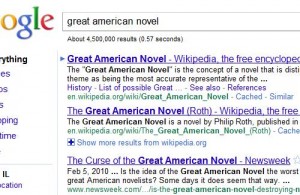Earlier this week I wrote a piece in response to an article in the New York Times responding to the migration of the young from blogs to other social media. The article is a worthwhile read: Blogs Wane as the Young Drift to Sites Like Twitter. My response is that blogs have advantages that other forms of social media do not, and that they shouldn’t be discounted as a powerful tool. But I didn’t get into a discussion of the specific advantages blogs can offer writers. That’s today’s topic.
Before I get to the extraordinary advantage of blogs, I’ll start with something that seems, at first glance, a bit more mundane. Your blog can be your official but informal public platform. Think about that for a moment. It can be an official platform, which means it concerns itself primarily with you (no need to hesitate on self-promotion) and statements you make will be considered authoritative to your work. It can be a public platform: anyone can see it, whether in Topeka or Taipei. And this is the beautiful part: it can be informal. Like a conversation at a party (or wine-and-cheese after a highly successful book signing) these conversations can be witty, wide-ranging, informative, lucid, persuasive, useful, and memorable. You don’t need the economy of a sound bite or the formality of a press-release. Yeah, good writing is important — it always is — but a blog gives you great control over the style and form that writing takes. As I’ve said, this is something other social media cannot accomplish as ably.
But these ordinary, if remarkable, advantages point to another advantage, which is much more extraordinary. There are millions and millions of websites all competing for traffic, and most-likely, after your friends and family have dropped in on yours, you’ll have a hard time maintaining traffic. In this sense, blogging is a no-brainer: it gives your fans and supporters a good reason to come back for more. But a further, extraordinary advantage is in a thing called search-engine optimization, or SEO.
Many writers aren’t even familiar with the concept of SEO, although it’s a critical component of most successful websites. Quite simply, a website with SEO is a website written and designed to draw traffic from search engines: Google, Bing, Yahoo! and other vehicles that match typed queries to online destinations. And there’s a huge industry — largely unregulated with both legitimate SEOs and plenty of chicanery — devoted to building websites that turn up on the first page of Google. Most SEO work involves site architecture and writing to pull to search-engines’ strengths. On the outliers, sites try to “trick” search engines into higher rankings than they deserve, and search engines are always trying to respond to these tricks. I’ve consulted with clients on these concerns, and they’re expensive and complex problems to try and solve.
Most of you starving artists cannot afford the services of a legitimate SEO which can run hundreds or thousands per month. You don’t want to mess with anything cheap or unscrupulous. If you have the time, there are good Dummies and Idiots books to do your own rudimentary SEO (although you should remember that this is a highly evolving field and a book two years old is far out-of-date). But as it turns out, there is one completely accessible solution that will go a long way to optimize your site. Every writer should have a website, and every writer’s website should utilize this solution.
The solution is: blogging.
Remember how I said earlier that SEO is making a website attractive to search engines, which drive visitors (and potential readers) to your site? And how I said that search engines are always trying to respond to “tricks” and give users the best results? The best SEO doesn’t rely on tricks to outsmart the search-engines. The very best SEO coorperates with the search engines to help provide browsers with excellent content. By blogging regularly (and enabling your blog with an RSS feed and search-engine ping — something any blogging service can set up for free) you produce content that search-engines can find. By writing nuanced, detailed, specific posts you reward viewers with quality information. The first benefit is that the search engines are actually looking for sites like yours… and the more you write, the more information they’ll be able to pick up on. The second benefit is that your visitors will like what they see. They’ll be more likely to stay and read, to come back again, to send their friends, and (hopefully) to buy your book.
You can utilize a qualified SEO to help set up your website, and if you have the budget, you should do so. But if you’re scraping by, a couple well-written posts each week will do a lot of the job for you.
So I’ve sold you on a blog. Does that mean you should suspend your Facebook and delete your Twitter? No! Stop right there! Put the mouse down! Blogging and other social media together work far better than either works alone. Check in next week to learn how your blog can help your other networks, and vice versa.
